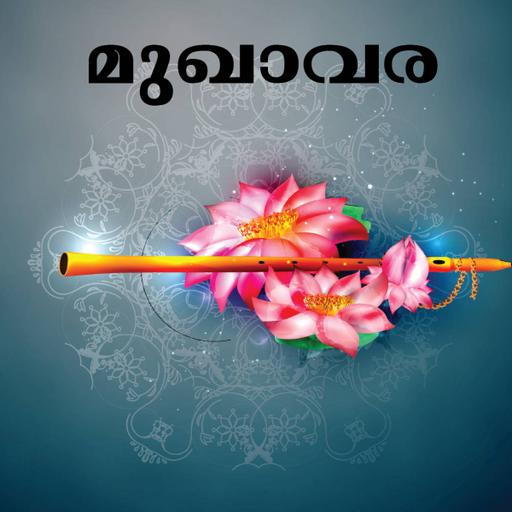Mukhavura
Audio | Malayalam
The Gita is set in a narrative framework of a dialogue between Pandava prince Arjuna and his guide, charioteer, Krishna, an incarnation of Lord Vishnu narrated by Vyasa. Arjun was filled with At the start of the Dharma Yuddha (righteous war) between and Kauravas, Arjuna was filled with moral dilemma and despair about the violence and death the war will cause in the battle against his own kind. He wonders if he should renounce and seeks Krishna's counsel. Those answers and discourse constitute the Bhagavad Gita. In order to fulfill his kshatriya (warrior) duty Krishna counsels Arjuna to uphold the dharma (righteousness) through "selfless action". Krishna states in bhagavatgita that the body is impermanent and dies. It is never the immortal Self. He also staes that Moksha is for those who have understood the true spiritual path which he teaches in Gita. The Krishna–Arjuna dialogues cover a broad range of spiritual topics. The conversation also teaches ethical dilemmas as well as philosophical issues. According to some people, Bhagavat Gita is written by God Ganesha and the story was told him by Krishna Dvaipayana better known as Vyasa, who was a legendary sage portrayed in the hindu epic Mahabharata. The setting of the Gita in a battlefield has been elucidated as a symbol for the ethical and moral struggles of human life. Bhgavat Gita is a poem written in Sanskrit language. It has eighteen chapters in total. It comprises of seven hundred verses which are structured several ancient Indian poetic meters. The original Bhagavad Gita has no chapter titles. Arjuna is also known as Partha and Dhananjaya. He is one of the major characters of the Indian epic Mahabharata. He also appears in other ancient Hindu texts including the Bhagavata Purana. In the epic, he is the third among Pandavas, the five sons of Pandu. He was a key warrior from the Pandava side and defeated many warriors including Karna.
പാണ്ഡവ രാജകുമാരൻ അർജ്ജുനനും അദ്ദേഹത്തിന്റെ വഴികാട്ടിയായ സാരഥിയും വ്യാസൻ വിവരിച്ച മഹാവിഷ്ണുവിന്റെ അവതാരമായ കൃഷ്ണനും തമ്മിലുള്ള സംഭാഷണത്തിന്റെ ആഖ്യാന ചട്ടക്കൂടിലാണ് ഗീത സജ്ജീകരിച്ചിരിക്കുന്നത്. കൗരവരും തമ്മിലുള്ള ധർമ്മയുദ്ധത്തിന്റെ (നീതിപരമായ യുദ്ധത്തിന്റെ) തുടക്കത്തിൽ അർജ്ജുനൻ നിറഞ്ഞു, അർജ്ജുനൻ തന്റെ സ്വന്തം വിഭാഗത്തിനെതിരായ പോരാട്ടത്തിൽ യുദ്ധം ഉണ്ടാക്കുന്ന അക്രമത്തെയും മരണത്തെയും കുറിച്ചുള്ള ധാർമ്മിക പ്രതിസന്ധിയും നിരാശയും നിറഞ്ഞു. ത്യജിക്കണമോ എന്ന് അയാൾ ചിന്തിച്ച് കൃഷ്ണന്റെ ഉപദേശം തേടുന്നു. ആ ഉത്തരങ്ങളും പ്രഭാഷണങ്ങളും ഭഗവദ് ഗീതയാണ്. തന്റെ ക്ഷത്രിയ (യോദ്ധാവ്) കർത്തവ്യം നിറവേറ്റുന്നതിനായി കൃഷ്ണൻ അർജ്ജുനനെ "നിസ്വാർത്ഥമായ പ്രവർത്തനത്തിലൂടെ" ധർമ്മം (നീതി) ഉയർത്തിപ്പിടിക്കാൻ ഉപദേശിക്കുന്നു. ശരീരം നശ്വരമാണെന്നും നശ്വരമാണെന്നും കൃഷ്ണൻ ഭഗവത്ഗീതയിൽ പറയുന്നു. അതൊരിക്കലും അനശ്വരമായ സ്വയം അല്ല. ഗീതയിൽ താൻ പഠിപ്പിക്കുന്ന യഥാർത്ഥ ആത്മീയ പാത മനസ്സിലാക്കിയവർക്കാണ് മോക്ഷമെന്നും അദ്ദേഹം പ്രസ്താവിക്കുന്നു. കൃഷ്ണ-അർജുന സംഭാഷണങ്ങൾ ആത്മീയ വിഷയങ്ങളുടെ വിശാലമായ ശ്രേണി ഉൾക്കൊള്ളുന്നു. സംഭാഷണം ധാർമ്മിക പ്രതിസന്ധികളും ദാർശനിക പ്രശ്നങ്ങളും പഠിപ്പിക്കുന്നു. ചില ആളുകൾ പറയുന്നതനുസരിച്ച്, ഭഗവത് ഗീത എഴുതിയത് ഗണേശനാണ്, ഹിന്ദു ഇതിഹാസമായ മഹാഭാരതത്തിൽ ചിത്രീകരിക്കപ്പെട്ട ഒരു ഇതിഹാസ ഋഷിയായിരുന്ന വ്യാസൻ എന്നറിയപ്പെടുന്ന കൃഷ്ണ ദ്വൈപായനാണ് അദ്ദേഹത്തോട് കഥ പറഞ്ഞത്. മനുഷ്യജീവിതത്തിന്റെ ധാർമ്മികവും ധാർമികവുമായ പോരാട്ടങ്ങളുടെ പ്രതീകമായി ഗീതയെ ഒരു യുദ്ധഭൂമിയിൽ സ്ഥാപിക്കുന്നത് വ്യക്തമാക്കപ്പെട്ടിട്ടുണ്ട്. സംസ്കൃത ഭാഷയിൽ എഴുതിയ ഒരു കാവ്യമാണ് ഭഗവത് ഗീത. ഇതിന് ആകെ പതിനെട്ട് അധ്യായങ്ങളുണ്ട്. എഴുനൂറ് ശ്ലോകങ്ങൾ ഇതിൽ ഉൾപ്പെടുന്നു, അവ നിരവധി പുരാതന ഇന്ത്യൻ കാവ്യാത്മക മീറ്ററുകൾ ഉൾക്കൊള്ളുന്നു. യഥാർത്ഥ ഭഗവദ് ഗീതയ്ക്ക് അധ്യായങ്ങളൊന്നുമില്ല. അർജുനൻ പാർത്ഥ എന്നും ധനഞ്ജയൻ എന്നും അറിയപ്പെടുന്നു. ഇന്ത്യൻ ഇതിഹാസമായ മഹാഭാരതത്തിലെ പ്രധാന കഥാപാത്രങ്ങളിൽ ഒരാളാണ് അദ്ദേഹം. ഭാഗവത പുരാണം ഉൾപ്പെടെയുള്ള മറ്റ് പുരാതന ഹിന്ദു ഗ്രന്ഥങ്ങളിലും അദ്ദേഹം പ്രത്യക്ഷപ്പെടുന്നു. ഇതിഹാസത്തിൽ, പാണ്ഡുവിന്റെ അഞ്ച് മക്കളായ പാണ്ഡവരിൽ മൂന്നാമനാണ് അദ്ദേഹം. പാണ്ഡവ പക്ഷത്തെ പ്രധാന യോദ്ധാവായിരുന്ന അദ്ദേഹം കർണ്ണൻ ഉൾപ്പെടെ നിരവധി യോദ്ധാക്കളെ പരാജയപ്പെടുത്തി.

Free
MP3 (1 Units)
Mukhavura
Audio | Malayalam
